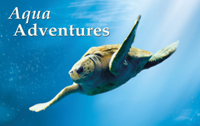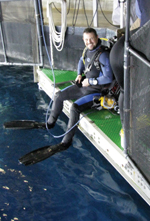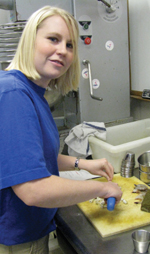By Dawn Brazell
Public Relations
It's a good thing David Geddings has a great sense of humor.
The fish circling his wetsuit, twining through the tubing of his breathing gear seem not to bother him. Nor do the 385,000 gallons of salt water in which he is immersed or the sharks that swim above him, or even worse, the inquiring faces of preschoolers massed outside the Great Ocean Tank of the S.C. Aquarium. |

|
 |
David Geddings prepares for a dive show at the S.C. Aquarium, where he volunteers.
His job is not to bore them.
By day, Geddings works in MUSC's Department of Pediatrics solving various information technology issues. On some weekends, though, he can be found volunteering at the aquarium trying to stay out of the way of sharks and eels. He's one of about a dozen MUSC employees who have found aquarium volunteer work to be very satisfying.
Shawna Byrne, a psychometrist who works in MUSC's Developmental Pediatrics, said her volunteer work as an aquarist assistant helps her |
pursue a longtime interest she has had in animals. She ended up on a different career path, but found volunteering feeding the fish and maintaining the tanks and salt marsh lets her get her animal fix.
It's educational as well.
"I've learned to keep my fingers away from the turtles' mouths," she said, smiling. "It's a way to give back to the community. It adds some variety to day-to-day life.
It keeps things a little more interesting. I sit down all day at work. Here, it's more active on my feet and getting my hands dirty and smelly. The fish here are very well fed."
Byrne, who said she can't be squeamish to do her jobs, particularly enjoys arriving early before the aquarium opens, when it's peaceful. She has learned much more about sustainable seafood and the role she can play in conservation. The other part she loves about her job is interacting with the public.
"Feeding is my favorite job. It's the most fun interacting with the fish. It's fun interacting with the visitors. Little kids are funny. They're so amazed."
Kate Dittloff, public relations manager for the aquarium, said the volunteers outnumber the aquarium's paid staff by a 3-to-1 ratio. More than 300 volunteers give an average of 45,000 hours each year.
"They can be found in every part of the aquarium working alongside paid staff, educating and entertaining visitors, feeding our collection, cleaning habitats, tending the sick and wounded in our hospital and helping out in the offices. Simply put, we would not be in business without our volunteers."
Geddings, who has been a diver for nine years, said it's a win-win situation for him. He gets to have fun diving and keep up his skills and be an ambassador for the aquarium and conservation efforts.
"You play with all the animals. We're here diving when it's 23 degrees outside and everyone else has hung up their diving gear until spring."
It's a big commitment for divers, who report two days a month for a full-day shift. The tank has 750 fish with about 55 species. Geddings has learned most of them. He especially likes the loggerhead sea turtle, who's lovely, but not that bright. He misses Ozzie and Harriet, puffer fish who have passed away, and a blind cobia who used to be led around by other cobia, who knew she needed help, he said. They would steer her away from the walls and the sharks when they were in aggressive moods.
Divers get to know the moods of the sharks and always swim in pairs. Geddings had his first close encounter on a check-out dive when he was performing an emergency ascent that requires the diver to put arms above the head and surface quickly. Unfortunately, for Geddings, he plowed straight into an eight-foot sand tiger.
"She didn't even budge. She kept on her merry way."
It was quite the initiation dive, he said. He recalls other times when he's been vacuuming the floor and had the tiger sharks flank him, making a diamond pattern. Visitors try to help him, frantically motioning for him to look behind to see the sharks all around. Geddings, who's used to coming head-to-head with them, said fortunately they are well trained. He has to remind himself of that when he's in the Atlantic diving and comes across sharks who don't know him.
What he worries about more than the sharks are the eels, who are blind and nocturnal.
"They just bite at a space, so I have to keep my eyes on them. Their teeth are inverted, so if you pull back, you're helping them."
The nurse sharks Geddings describes as mischievous. They don't have to stay moving to keep water over their gills. "You'll be down there doing feedings, and they just come and flop down on your feet and get any food other fish have left behind. They're like little dustbusters."
 |
One of the favorite volunteer jobs of Shawna Byrne, a psychometrist at MUSC, is to feed the fish at the S.C. Aquarium.
Like Byrne, he enjoys interacting with people and often gives community talks about the aquarium. He especially likes hosting the dive shows, educating people who literally come from around the nation and world.
He feels he's giving back and enjoys going out into the community to teach about the animals. He said his department at MUSC believes in being active with the Trident United Way cause and encourages volunteer work, so the aquarium work fits nicely with that goal.
"I feel I'm giving back. I like to volunteer, to help out. I'm like part of the staff here. We're kind of like their ambassadors now. We're always talking it up. It helps to drum up the interest. Without people, there would be no aquarium." |
He never knows when his talk will keep a plastic bag from polluting the water or raise consciousness on other issues that affect the quality of marine life. "The worst stream ends up somewhere."
For More Info:
For discounted tickets, go to http://www.scaquarium.org and click on plan your visit and then purchase online. Enter MUSC-BEE for your employee discount.
The next volunteer orientation will be held from 9 a.m. to 12:30 p.m., March 26. For information, call 579-8560 and 579-8553. |





